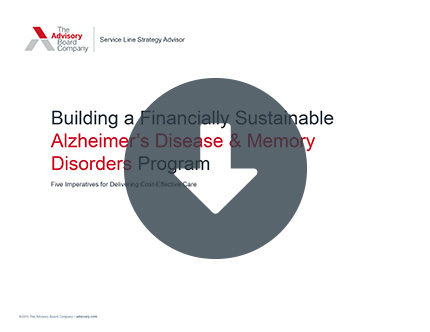Auto logout in seconds.
Continue LogoutEditor's note: This story was updated on June 13, 2019.
Forgetfulness is not a serious health problem, but experts say there are some health issues and lifestyle choices that exacerbate memory problems, TIME/Health.com report.
Build a cost-effective Alzheimer's disease and memory disorders program
Health issues that aggravate memory problems include:
- A dysfunctional thyroid. "Although the thyroid doesn't have a specific role in the brain, memory loss is the one thing a person notices when it stops functioning normally," says Majid Fotuhi, founder of NeurExpand Brain Center and co-author of The Memory Cure. He adds that patients can ask their physician for a simple thyroid test to determine whether they have an issue.
- Lack of sleep. "While some part of the brain takes a siesta when we sleep, deeper areas involved with memory and emotional response become relatively more active," says Allen Towfigh, medical director of New York Neurology & Sleep Medicine. The recommended eight hours may not be enough, if patients still feel fatigued after eight hours of sleep, Towfigh says.
- Hot flashes. A common side effect of menopause and other conditions, hot flashes create brain "fogginess," making remembering names difficult. "Fortunately, hot flashes don't damage the brain in any way. Memory improves once the hot flashes subside," Fotuhi says.
- Anxiety and depression. Stress increases cortisol levels in the brain which causes brain cells to lose synapses—the bridges that enable cells to retrieve memories. Towfigh says, "The severity of the memory loss often mirrors the severity of the mood disorder, [but] as the individual's mood improves, often so does the memory loss." Moreover, stress brought on in an emergency can make remembering simple information difficult, because it reduces receptors in the part of the brain that is connected to thought processes.
Lifestyle choices may also heighten memory problems, such as:
- Prescription drugs. Common prescription medications, such as Ativan, Xanax, and Valium, can inhibit the part of the brain that moves memories from the short-term to the long-term. Additionally, antidepressants and heart medicines, such as statins and beta blockers, have been linked to forgetfulness.
- Germ exposure. Researchers involved in a 2013 study found people who were exposed to many germs over their lifetimes were more likely to have memory problems than those exposed to fewer germs. Those with a higher "infectious burden" had a 25% increased risk of scoring low on a cognitive test.
- Smoking. "Smoking damages the brain by impairing its blood supply…furthermore, cigarette smoking promotes the accumulation of abnormal proteins which impair the brain's ability to process and relay information," Towfigh says.
- A high-fat diet. Two studies on mice found that high-fat diets negatively affect the hippocampus—the part of the brain responsible for short-term memory. "This holds true earlier in life, too. Studies link childhood obesity with a reduced attention span and impaired concentration and focus," Towfigh says.
"Fortunately, your brain is malleable, meaning it changes and improves," says Fotuhi, adding, "memory can be boosted with simple powerful interventions," such as:
- Exercise. "Physical exercise improves mood and sleep and by doing so, it invariably improves cognition and memory," says Towfigh. Fotuhi recommends 45 minutes of exercise four days a week.
- Green tea. Chemicals found in green tea, such as EGCG and L-theanine, improve memory, according to a University of Basel study. The Japanese beverage increases growth of new brain cells in the hippocampus.
- Upping vitamin B12 intake. Vegetarians and vegans are at a higher risk of a vitamin B12 deficiency, since it is naturally occurring in shellfish, eggs, dairy, and other meats. Physicians can administer a blood test to determine if B12 is the culprit, and patients can add the vitamin into their diets by taking a supplement.
- Meditate. Meditating both relieves stress and improves memory, according to a UC-Santa Barbara study. Students who completed 45-minute meditation sessions over eight weeks improved their Graduate Record Examination scores (Melone, TIME/Health.com, 8/29).
How to deliver cost-effective Alzheimer's care
Over 5.3 million Americans currently suffer from Alzheimer’s disease and related memory disorders and the Alzheimer’s Association predicts this number to triple to 13.8 million by 2050.
To learn more about how leading memory disorders programs are allocating their resources, download our brief Building a Financially Successful Alzheimer’s Disease and Memory Disorders Program.
Don't miss out on the latest Advisory Board insights
Create your free account to access 1 resource, including the latest research and webinars.
Want access without creating an account?
You have 1 free members-only resource remaining this month.
1 free members-only resources remaining
1 free members-only resources remaining
You've reached your limit of free insights
Become a member to access all of Advisory Board's resources, events, and experts
Never miss out on the latest innovative health care content tailored to you.
Benefits include:
You've reached your limit of free insights
Become a member to access all of Advisory Board's resources, events, and experts
Never miss out on the latest innovative health care content tailored to you.
Benefits include:
This content is available through your Curated Research partnership with Advisory Board. Click on ‘view this resource’ to read the full piece
Email ask@advisory.com to learn more
Click on ‘Become a Member’ to learn about the benefits of a Full-Access partnership with Advisory Board
Never miss out on the latest innovative health care content tailored to you.
Benefits Include:
This is for members only. Learn more.
Click on ‘Become a Member’ to learn about the benefits of a Full-Access partnership with Advisory Board
Never miss out on the latest innovative health care content tailored to you.


